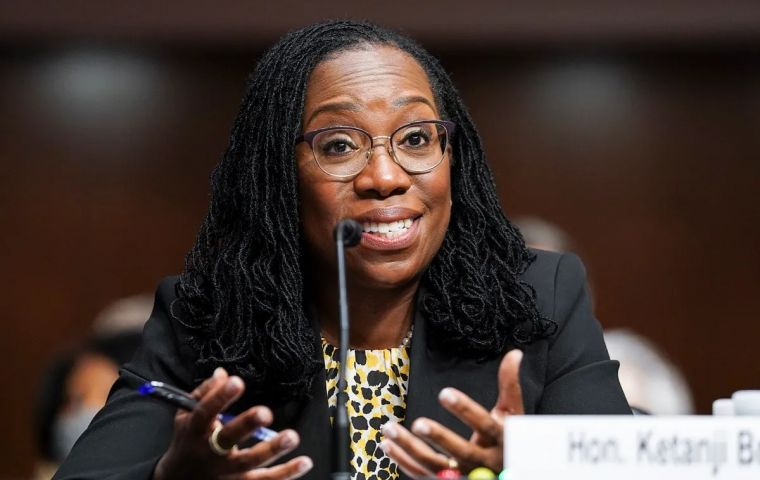MercoPress. South Atlantic News Agency
First African-American woman sworn into SCOTUS
 A Harvard Law graduate, Jackson had said during her confirmation hearing that it would be inappropriate to raise gender or race issues when evaluating a case
A Harvard Law graduate, Jackson had said during her confirmation hearing that it would be inappropriate to raise gender or race issues when evaluating a case Ketanji Brown Jackson was sworn in by Supreme Court Chief Justice John Roberts, Jr., thus becoming the first-ever African American woman to sit on the highest court of the United States.
The new magistrate placed her hand on a Bible held by her husband and took the two oaths to fulfill the final requirement and take office. Then she thanked her new colleagues for their “warm and gracious welcome.”
Brown Jackson is replacing Justice Stephen Breyer, who chose to retire after almost 28 years on the bench. Jackson, who had clerked for a year in 1999, described the outgoing judge as “a personal friend and mentor of mine for the past two decades.”
The new judge, whose appointment was endorsed by President Joseph Biden, is expected to fill out the court’s liberal wing alongside Justice Sonia Sotomayor and Elena Kagan.
The 51-year-old justice was previously a judge on the US Court of Appeals for the DC Circuit, a role she was appointed to in 2021 after nine years as a district court judge. Earlier, she was vice-chair of the US Sentencing Commission, tasked with judging whether federal sentences were just. She also worked in private practice and as a public defender.
Biden had made it clear that race and gender were key factors in her selection. However, “I would think that race would be the kind of thing that would be inappropriate to inject in an evaluation of a case,” she said during her confirmation hearing.
Jackson had also been interviewed in 2016 by then-president Barack Obama to replace the deceased Antonin Scalia. Obama ended up selecting Merrick Garland, whose nomination the Senate controversially refused to vote on and who was ultimately appointed Attorney General under Biden.
Regarding ethnicity, Jackson would be the third African-American Supreme Court Justice after Thurgood Marshall was nominated by then-President Lyndon B. Johnson in 1967. When he retired in 1991 due to health issues, President George H.W. Bush's nominee Clarence Thomas became the second such case.
A Harvard Law graduate, Jackson joins the Supreme Court just days after the overturning of the 1973 Roe v Wade decision, which sparked nationwide rioting and even led to the arrest of one man who was allegedly plotting to kill conservative Justice Brett Kavanaugh.




Top Comments
Disclaimer & comment rulesCommenting for this story is now closed.
If you have a Facebook account, become a fan and comment on our Facebook Page!